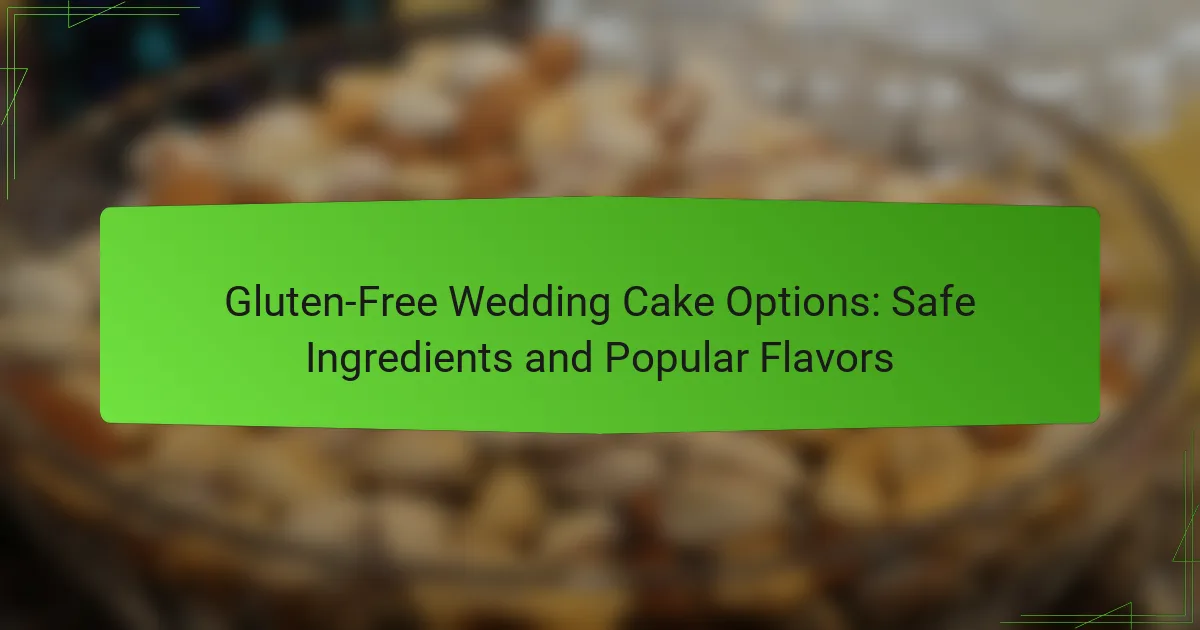
What are Gluten-Free Wedding Cake Options?
Gluten-free wedding cake options include cakes made with alternative flours such as almond, coconut, or rice flour. These flours provide a suitable base for gluten-sensitive individuals. Popular flavors for gluten-free wedding cakes include vanilla, chocolate, and lemon. Many bakers specialize in gluten-free recipes to ensure taste and texture are maintained. Gluten-free cakes can be layered and decorated just like traditional cakes. Additionally, many gluten-free options are available in bakeries that cater specifically to dietary restrictions. Research indicates that gluten-free alternatives can still deliver a satisfying flavor profile. This ensures that all guests can enjoy the wedding cake without dietary concerns.
Why choose a gluten-free wedding cake?
A gluten-free wedding cake is chosen to accommodate guests with gluten sensitivities or celiac disease. Many individuals cannot consume gluten without experiencing adverse health effects. A gluten-free cake ensures that all guests can enjoy the dessert without health risks. Gluten-free options can be made with alternative flours like almond, coconut, or rice flour. These ingredients can provide unique flavors and textures. Additionally, gluten-free cakes can be just as delicious as traditional cakes. Many bakers specialize in gluten-free recipes, ensuring quality and taste. Choosing a gluten-free cake demonstrates thoughtfulness toward guests’ dietary needs.
What health considerations make gluten-free cakes popular?
Gluten-free cakes are popular due to health considerations related to gluten intolerance and celiac disease. Individuals with celiac disease cannot consume gluten, a protein found in wheat, barley, and rye. Consuming gluten can cause severe digestive issues and other health problems for these individuals. Gluten-free cakes provide a safe dessert option for those affected. Additionally, many people choose gluten-free products for perceived health benefits, such as improved digestion and reduced inflammation. The rising awareness of gluten-related disorders has increased the demand for gluten-free alternatives. Statistics show that approximately 1 in 100 people worldwide have celiac disease. This growing awareness contributes to the popularity of gluten-free cakes in various settings, including weddings.
How do gluten-free cakes cater to dietary restrictions?
Gluten-free cakes cater to dietary restrictions by using alternative flours instead of wheat. Common substitutes include almond flour, coconut flour, and rice flour. These ingredients allow individuals with celiac disease or gluten intolerance to enjoy baked goods safely. Gluten-free cakes often utilize binding agents like eggs or xanthan gum to maintain texture. Many gluten-free recipes also avoid cross-contamination with gluten-containing products. According to the Celiac Disease Foundation, about 1 in 100 people worldwide are affected by celiac disease. This makes gluten-free options essential for those with specific dietary needs.
What ingredients are safe for gluten-free wedding cakes?
Safe ingredients for gluten-free wedding cakes include almond flour, coconut flour, and rice flour. These flours provide a suitable base for gluten-free baking. Other safe ingredients are gluten-free baking powder and xanthan gum, which help improve texture and rise. Additionally, eggs and dairy products like butter and cream are typically gluten-free. Sugar and vanilla extract are also safe options. Fruits and gluten-free chocolate can be added for flavor and decoration. Many recipes utilize a combination of these ingredients to achieve the desired taste and consistency.
Which flours are commonly used in gluten-free wedding cakes?
Common flours used in gluten-free wedding cakes include almond flour, coconut flour, and rice flour. Almond flour provides a rich flavor and moist texture. Coconut flour is highly absorbent and often used in combination with other flours. Rice flour is a staple in gluten-free baking and offers a light texture. Other options include tapioca flour and sorghum flour, which enhance the cake’s structure. These flours are popular due to their unique properties and ability to mimic traditional wheat flour.
What role do binders play in gluten-free baking?
Binders in gluten-free baking serve to provide structure and moisture to baked goods. They help mimic the properties of gluten, which is absent in gluten-free flours. Common binders include xanthan gum, guar gum, and psyllium husk. These ingredients enhance the texture and prevent crumbling. Binders also improve the elasticity of the dough or batter. This is crucial for achieving a desirable crumb in cakes. Research indicates that the right binder can significantly improve the overall quality of gluten-free products. For instance, a study published in the Journal of Food Science found that xanthan gum effectively increases the viscosity of gluten-free mixtures, leading to better rise and texture.
What are the most popular flavors for gluten-free wedding cakes?
The most popular flavors for gluten-free wedding cakes include vanilla, chocolate, and lemon. Vanilla is favored for its classic taste and versatility. Chocolate offers a rich and indulgent option that many couples love. Lemon provides a refreshing and zesty alternative, especially in warmer months. Other popular flavors include almond, red velvet, and carrot. Almond adds a nutty richness, while red velvet is known for its unique color and flavor. Carrot cake is often chosen for its moist texture and spices. These flavors cater to various preferences and complement wedding themes.
How do traditional flavors translate to gluten-free options?
Traditional flavors can be adapted to gluten-free options by substituting gluten-containing ingredients with gluten-free alternatives. Common gluten-free flours include almond flour, coconut flour, and rice flour. These substitutes can mimic the texture and flavor of traditional wheat-based flours. For instance, almond flour adds moisture and a nutty flavor, while coconut flour provides a light and fluffy texture.
Additionally, flavorings such as vanilla, chocolate, and fruit purees remain unchanged in gluten-free recipes. This allows bakers to maintain the essence of traditional flavors. Many recipes also use binding agents like eggs or flaxseed to achieve the desired consistency in gluten-free cakes.
Research shows that gluten-free products can successfully replicate traditional flavors when the right combinations of ingredients are used. A study published in the Journal of Food Science highlighted that consumer acceptance of gluten-free baked goods improves with the use of familiar flavors and textures.
What unique flavor combinations can enhance a gluten-free wedding cake?
Unique flavor combinations that can enhance a gluten-free wedding cake include lemon and lavender, chocolate and raspberry, and almond and coconut. Lemon and lavender provide a fresh, aromatic profile that contrasts beautifully with the sweetness of the cake. Chocolate and raspberry create a rich, indulgent experience, appealing to chocolate lovers. Almond and coconut offer a tropical twist, adding depth and moisture to the cake. These combinations not only enhance the taste but also elevate the overall aesthetic of the wedding cake.
How can I ensure my gluten-free wedding cake is delicious?
Use high-quality gluten-free flours to ensure your gluten-free wedding cake is delicious. Almond flour, coconut flour, and gluten-free all-purpose flour are excellent options. These flours provide moisture and flavor that enhance the cake’s taste. Incorporate ingredients like eggs and yogurt to improve texture and richness. Adding natural sweeteners can elevate the flavor profile.
Experiment with flavorings such as vanilla extract or citrus zest for added depth. Ensure proper baking time and temperature to achieve the best results. Utilizing a recipe specifically designed for gluten-free cakes can prevent common pitfalls. Many gluten-free cake recipes have been tested and proven to be delicious by bakers.
What tips can help in selecting the right baker for gluten-free cakes?
Look for bakers with experience in gluten-free baking. Verify their knowledge of gluten-free ingredients. Ask about their kitchen practices to avoid cross-contamination. Request samples to assess taste and texture. Check online reviews for customer feedback on gluten-free cakes. Inquire about their use of certified gluten-free products. Ensure they can accommodate specific dietary restrictions. Discuss customization options to meet your preferences.
How can I customize a gluten-free cake to suit my wedding theme?
To customize a gluten-free cake for your wedding theme, choose flavors and colors that match your theme. Incorporate themed decorations, such as edible flowers or cake toppers. Use gluten-free flours like almond or coconut to create unique textures. Consider adding fillings that reflect your theme, like fruit preserves or flavored creams. Design the cake shape and tiering to align with your wedding aesthetics. Ensure that the cake’s presentation matches the overall decor of the venue. Personal touches, such as monograms or themed motifs, can enhance the cake’s visual appeal.
What common mistakes should I avoid when choosing a gluten-free wedding cake?
Common mistakes to avoid when choosing a gluten-free wedding cake include not verifying ingredient labels. Gluten can be hidden in various products, so it’s essential to ensure all ingredients are certified gluten-free. Another mistake is assuming all gluten-free flours perform the same. Different flours have unique properties, affecting taste and texture. Failing to communicate dietary restrictions to the baker can lead to cross-contamination. It’s crucial to discuss gluten-free needs explicitly. Additionally, overlooking taste testing can result in an unsatisfactory cake. Always sample the cake beforehand to ensure it meets expectations. Not considering the cake’s structure is also a mistake. Gluten-free cakes can be denser, so choose designs that accommodate this characteristic.
How can I prevent cross-contamination in gluten-free baking?
To prevent cross-contamination in gluten-free baking, use separate utensils and equipment. Designate specific tools for gluten-free baking only. Thoroughly clean surfaces before starting. Store gluten-free ingredients in airtight containers. Avoid using flour from shared sources. Educate everyone involved about cross-contamination risks. According to the Celiac Disease Foundation, even small amounts of gluten can cause reactions in sensitive individuals. Implementing these practices helps ensure safety in gluten-free baking.
What should I consider when tasting gluten-free cake samples?
When tasting gluten-free cake samples, consider texture, flavor, and ingredients. Gluten-free cakes may have different textures than traditional cakes. Look for moistness and density, as these can indicate quality. Evaluate the flavor profile; it should be rich and balanced. Check for any off-flavors that may arise from alternative flours. Pay attention to the ingredient list; ensure it uses safe, high-quality components. Common gluten-free flours include almond, coconut, and rice flour. Also, consider cross-contamination risks if you have gluten sensitivities. A well-made gluten-free cake should be enjoyable without compromising taste or safety.
Gluten-free wedding cake options include cakes made with alternative flours such as almond, coconut, and rice flour, catering to guests with gluten sensitivities or celiac disease. Popular flavors include vanilla, chocolate, and lemon, with many bakers specializing in gluten-free recipes to maintain taste and texture. Key considerations for gluten-free cakes involve safe ingredients, the role of binders, and customization to align with wedding themes. This article outlines the health benefits of gluten-free cakes, tips for selecting the right baker, and common mistakes to avoid when choosing a gluten-free wedding cake.
